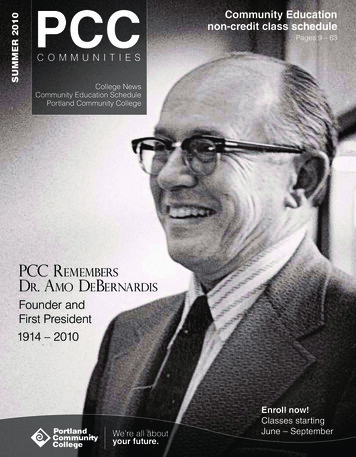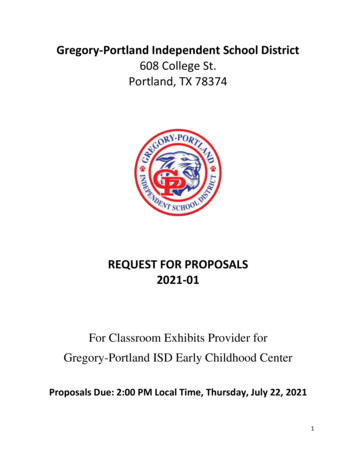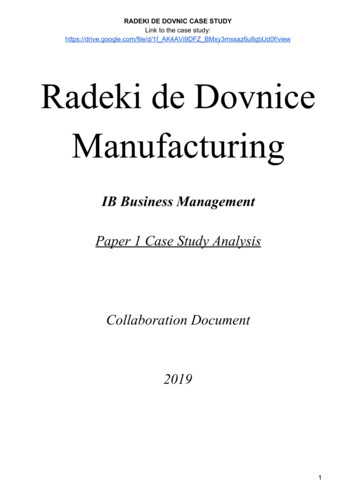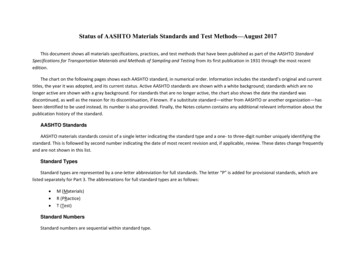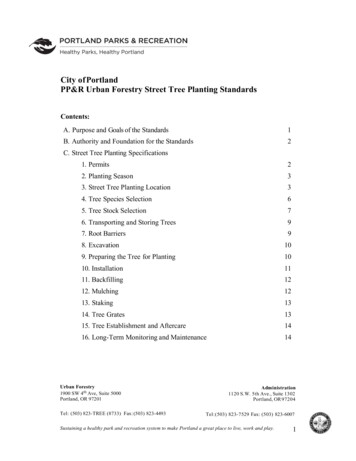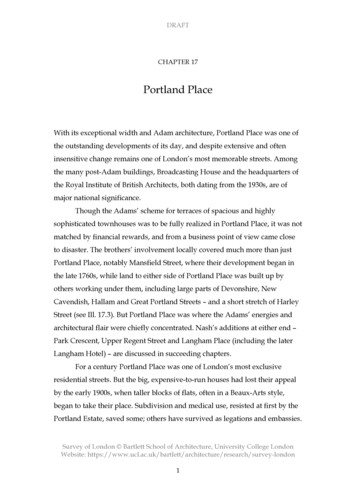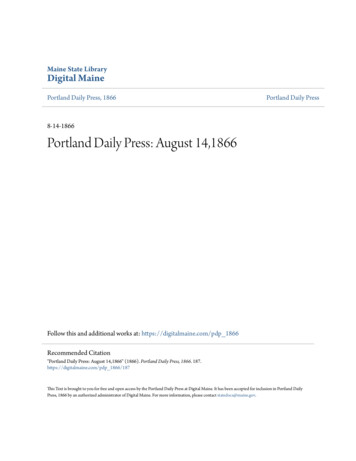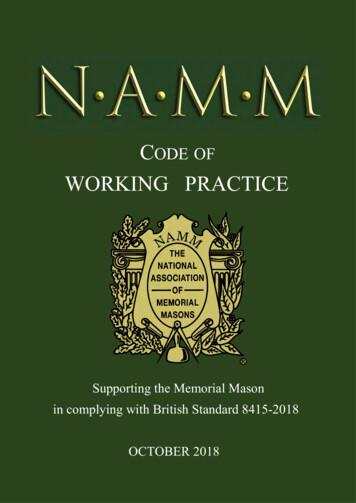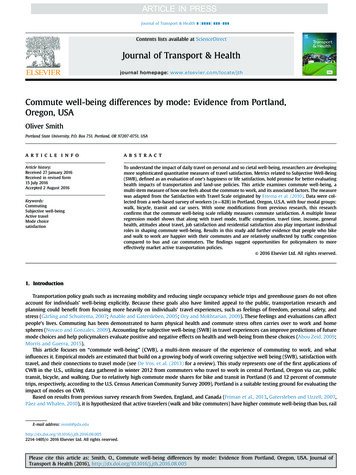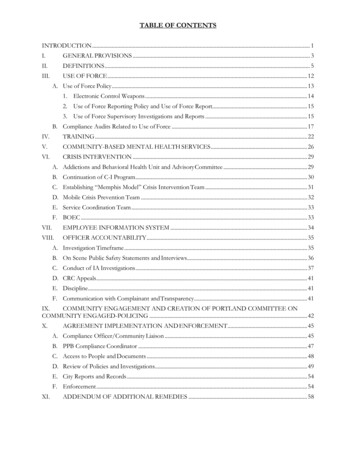
Transcription
TABLE OF CONTENTSINTRODUCTION . 1I.GENERAL PROVISIONS . 3II.DEFINITIONS . 5III.USE OF FORCE . 12A. Use of Force Policy. 131. Electronic Control Weapons . 142. Use of Force Reporting Policy and Use of Force Report. 153. Use of Force Supervisory Investigations and Reports . 15B. Compliance Audits Related to Use of Force . 17IV.TRAINING . 22V.COMMUNITY-BASED MENTAL HEALTH SERVICES . 26VI.CRISIS INTERVENTION . 29A. Addictions and Behavioral Health Unit and Advisory Committee . 29B. Continuation of C-I Program. 30C. Establishing “Memphis Model” Crisis Intervention Team . 31D. Mobile Crisis Prevention Team . 32E. Service Coordination Team . 33F. BOEC . 33VII.EMPLOYEE INFORMATION SYSTEM . 34VIII.OFFICER ACCOUNTABILITY . 35A. Investigation Timeframe . 35B. On Scene Public Safety Statements and Interviews. 36C. Conduct of IA Investigations . 37D. CRC Appeals. 41E. Discipline. 41F. Communication with Complainant and Transparency. 41IX.COMMUNITY ENGAGEMENT AND CREATION OF PORTLAND COMMITTEE ONCOMMUNITY ENGAGED-POLICING . 42X.AGREEMENT IMPLEMENTATION AND ENFORCEMENT. 45A. Compliance Officer/Community Liaison . 45B. PPB Compliance Coordinator . 47C. Access to People and Documents . 48D. Review of Policies and Investigations . 49E. City Reports and Records . 54F. Enforcement . 54XI.ADDENDUM OF ADDITIONAL REMEDIES . 58
UNITED STATES DISTRICT COURTDISTRICT OF OREGONUNITED STATES OF AMERICA,Plaintiff,v.CITY OF PORTLAND,Case No. 3:12-cv-02265-SIAMENDED SETTLEMENT AGREEMENTPURSUANT TO FED. R. CIV. P. 41(a)(2)Defendant.INTRODUCTIONThe United States and the City of Portland (“City”) (collectively “the Parties”) recognize thatthe vast majority of the City’s police officers are honorable law enforcement professionals who risktheir physical safety and well-being for the public good. The Parties enter into this Agreement withthe goal of ensuring that the Portland Police Bureau (“PPB”) delivers police services to the peopleof Portland in a manner that effectively supports officer and public safety, and complies with theConstitution and laws of the United States. Specifically, this Agreement is targeted to strengtheninitiatives already begun by PPB to ensure that encounters between police and persons withperceived or actual mental illness, or experiencing a mental health crisis, do not result in unnecessaryor excessive force.The Parties recognize there has been an accelerating movement toward a model of policemanagement that relies on both existing and still-developing management and monitoring tools andsystems. This model requires both vision and fiscal commitment, and is necessary to legitimatepolicing. The United States recognizes that PPB has endeavored to adopt components of modernmanagement despite being a lean organization, and greatly appreciates the City’s commitment, inthis agreement, to provide PPB the fiscal support necessary to rapidly and fully implement aPage 1[PROPOSED] Amended Settlement Agreement Pursuant to Fed. R. Civ. P. 41(a)(2)United States v. City of Portland, Case No. 3:12-cv-02265-SI
complete state- of-the-art management and accountability system. The Parties further recognize thatthe ability of police officers to protect themselves and the community they serve is largely dependenton the quality of the relationship they have with that community.Public and officer safety, constitutional policing, and the community’s trust in its policeforce are, thus, interdependent. The full and sustained implementation of this Agreement is intendedto protect the constitutional rights of all members of the community, continuously improve thesafety and security of the people of Portland, keep PPB employees safe, and increase publicconfidence in PPB, all in a cost- effective, timely, and collaborative manner. The United Statescommends the City for the steps it already has taken to implement measures to effectuate thesegoals.To fully achieve these goals, this Agreement requires the City and PPB to further revise or,where needed, adopt new policies, training, supervision, and practices in the following areas: the useof force, training, community-based mental health services, crisis intervention, employeeinformation system, officer accountability, and community engagement.This Agreement further requires that the City and PPB put in place more effective systemsof oversight and self-correction that will identify and correct problems before they develop intopatterns or practices of unconstitutional conduct and/or erode community trust.This Agreement further identifies measures, to be met within fixed periods of time, that willassist the Parties and the community in determining whether: (1) the City has changed its proceduresand taken the actions listed in this agreement; (2) community trust in PPB has increased; and (3) theimprovements will be sustainable.For these reasons, and noting the general principle that settlements are to be encouraged,particularly settlements between government entities, the Parties agree to implement this Agreementunder the following terms and conditions.Page 2[PROPOSED] Amended Settlement Agreement Pursuant to Fed. R. Civ. P. 41(a)(2)United States v. City of Portland, Case No. 3:12-cv-02265-SI
I.1.GENERAL PROVISIONSThe United States has filed a complaint in the Federal District Court for the Districtof Oregon in Portland, Oregon asserting that the City has engaged in a pattern and practice ofconstitutional violations pursuant to the authority granted to United States Department of Justice(“DOJ”) under 42 U.S.C. § 14141 to seek declaratory or equitable relief to remedy a pattern orpractice of conduct by law enforcement officers that deprives individuals of rights, privileges, orimmunities secured by the Constitution or federal law. The City expressly denies that the allegationsof the complaint are true.2.The Parties agree that nothing in this Agreement shall be construed as an admissionof wrongdoing by the City or evidence of liability under any federal, state, or municipal law. Uponexecution of this Agreement by both Parties, the United States agrees to conditionally dismiss thecomplaint it filed with prejudice, subject to the Court retaining jurisdiction to enforce theAgreement, followed by final dismissal with prejudice upon performance of this Agreement.3.This Agreement shall constitute the entire integrated agreement of the Parties. Noprior drafts or prior or contemporaneous communications, oral or written, shall be relevant oradmissible for purposes of determining the meaning of any provisions herein in any litigation or anyother proceeding. If, in the course of interpreting this Agreement, there is an ambiguity that cannotbe resolved by the Parties or in mediation, evidence including the Parties’ course of dealing and parolevidence may be used.4.This Agreement is binding upon all Parties hereto, by and through their officials,agents, employees, and successors. If the City establishes or reorganizes a government agency orentity whose function includes overseeing, regulating, accrediting, investigating, or otherwisereviewing the operations of PPB or any aspect thereof, the City agrees to ensure these functions andentities are consistent with the terms of this Agreement and shall incorporate the terms of thisPage 3[PROPOSED] Amended Settlement Agreement Pursuant to Fed. R. Civ. P. 41(a)(2)United States v. City of Portland, Case No. 3:12-cv-02265-SI
Agreement into the oversight, regulatory, accreditation, investigation, or review functions of thegovernment agency or entity as necessary to ensure consistency.5.This Agreement is enforceable only by the Parties. No person or entity is, or isintended to be, a third-party beneficiary of the provisions of this Agreement for purposes of anycivil, criminal, or administrative action, and accordingly, no person or entity may assert any claim orright as a beneficiary or protected class under this Agreement. The Parties agree to defend the termsof this Agreement should they be challenged in this or any other forum.6.This Agreement is not intended to impair or expand the right of any person ororganization seeking relief against the City, PPB, or any officer or employee thereof, for theirconduct or the conduct of PPB officers; accordingly, it does not alter legal standards governing anysuch claims by third parties, including those arising from city, state, or federal law. This Agreementdoes not expand, nor will it be construed to expand access to any City, PPB, or DOJ document,except as expressly provided by this Agreement, by persons or entities other than DOJ, the City, andPPB. All federal and state laws governing the confidentiality or public access to such documents areunaffected by the terms of this Agreement.7.The City shall be responsible for providing necessary support and resources toenable PPB to fulfill its obligations under this Agreement. The improvements outlined in thisAgreement will require the dedication of additional funds and personnel.8.The purpose of this Agreement is to ensure that the City and PPB, by and throughtheir officials, agents, employees, and successors, undertake the actions required by the Agreement,which in turn will resolve the concerns expressed by the United States in its complaint. The UnitedStates greatly appreciates the effort and expertise the current PPB leadership team has contributed tothe investigation, agreement, and ongoing reform processes. The United States feels that continuityof management and effort is essential for timely compliance with the terms of this Agreement.Page 4[PROPOSED] Amended Settlement Agreement Pursuant to Fed. R. Civ. P. 41(a)(2)United States v. City of Portland, Case No. 3:12-cv-02265-SI
II.DEFINITIONSUnless otherwise noted, the following terms and definitions shall apply to this Agreement:9.“Chief” means the Chief of Police of the Portland Police Bureau or his or herauthorized designee.10.“City” means the City of Portland, including its agents, officers, and employees intheir official capacity.11.“C-I-Team” stands for Crisis Intervention Team.12.“C-I-Training” stands for Crisis Intervention Training, which is training on how torespond to persons in behavioral or mental health crisis, including persons under the influence ofdrugs or alcohol. Officers who receive such training are “C-I- Trained.”13.“City Auditor” is the City Auditor, whose duties regarding independent policeoversight are governed by Portland City Code Chapter 3.21.14.“COCL” refers to the Compliance Officer Community Liaison, discussed in detail inSection X.15.“Complainant” means any person, including a PPB officer or employee, who makes acomplaint against PPB or a sworn officer.16.“Complaint” means any complaint made to the City by a member of the public, aPPB officer, or a civilian PPB employee of alleged misconduct by a sworn PPB employee.17.Computer-Assisted Dispatch (“CAD”) is a computerized method of dispatchingpolice officers on a service call. It can also be used to send messages to the dispatcher and store andretrieve data (i.e., radio logs, field interviews, schedules, etc.). PPB Manual 612.00.18.“CRC” is the Citizen Review Committee, whose duties are governed by PortlandCity Code Section 3.21.080.Page 5[PROPOSED] Amended Settlement Agreement Pursuant to Fed. R. Civ. P. 41(a)(2)United States v. City of Portland, Case No. 3:12-cv-02265-SI
19.“Critical firearm discharge” means each discharge of a firearm by a PPB officer. Thisterm includes discharges at persons where no one is struck. This term is not intended to includedischarges at the range or in training or negligent discharges not intended as an application of force,which are still subject to administrative investigation.20.“Day” means a calendar day.21.“Demographic category” means to the extent such information is currently collectedby PPB, age, race, color, ethnicity, national origin, religion, gender, disability, sexual orientation,source of income, or gender identity.22.“Discipline” means a personnel action for violation of an established law, regulation,rule, or PPB policy, including written reprimand, suspension, demotion, or dismissal.23.“DOJ” refers jointly to the Civil Rights Division of the United States Department ofJustice and the United States Attorney’s Office for the District of Oregon.24.“ECW” means Electronic Control Weapon, a weapon, including Tasers, designedprimarily to discharge electrical charges into a subject that will cause involuntary muscle contractionsand overrides the subject’s voluntary motor responses.25.“ECW application” means the contact and delivery of electrical impulse to a subjectwith an ECW.26.“Effective Date” means the date this Agreement is entered by the Court.27.“EIS” means the Employee Information System as provided in PPB Manual 345.00.28.“Ensure” means that the City and PPB are using objectively good faith efforts toachieve the outcome desired.29.“Exigent circumstances” means circumstances in which a reasonable person wouldbelieve that imminent and serious bodily harm to a person or persons is about to occur.Page 6[PROPOSED] Amended Settlement Agreement Pursuant to Fed. R. Civ. P. 41(a)(2)United States v. City of Portland, Case No. 3:12-cv-02265-SI
30.“Firearm” is any instrument capable of discharging ammunition as defined in PPBManual 1020.00.31.“Force” means any physical coercion used to effect, influence or persuade anindividual to comply with an order from an officer. The term shall not include the ordinaryhandcuffing of an individual who does not resist.32.“IA” means the Internal Affairs unit of PPB’s Professional Standards Division(“PSD”).33.“Implement” or “implementation” means the development or putting into place of apolicy or procedure, including the appropriate training of all relevant personnel, and the consistentand verified performance of that policy or procedure in actual practice through the regular use ofaudit tools.34.“Including” means “including, but not limited to.”35.“Inspector” is a command position in the PSD responsible for reviewing all uses offorce and making recommendations regarding improvements to systems of accountability in relationto force management.36.“IPR” means the Independent Police Review Division, an independent, impartialoffice, readily available to the public, responsible to the City Auditor, empowered to act oncomplaints against sworn PPB members for alleged misconduct, and recommend appropriatechanges of PPB policies and procedures toward the goals of safeguarding the rights of persons andof promoting higher standards of competency, efficiency, and justice in the provision of communitypolicing services, governed by Portland City Code Chapter 3.21.37.“Less-lethal” force means a force application that is not intended or expected tocause death or serious injury and that is commonly understood to have less potential for causingPage 7[PROPOSED] Amended Settlement Agreement Pursuant to Fed. R. Civ. P. 41(a)(2)United States v. City of Portland, Case No. 3:12-cv-02265-SI
death or serious injury than conventional, more lethal police tactics. Nonetheless, use of less-lethalforce can result in death or serious injury.38.“Lethal force” means any use of force likely to cause death or serious physical injury,including the use of a firearm, carotid neck hold, or strike to the head, neck, or throat with a hardobject.39.“Line Investigation” or “Directive 940.00 Investigation” means the use of forceinvestigation conducted pursuant to PPB Directive 940.00.40.“Mental Health Crisis” means an incident in which someone with an actual orperceived mental illness is experiencing intense feelings of personal distress (e.g., anxiety, depression,anger, fear, panic, hopelessness), obvious changes in functioning (e.g., neglect of personal hygiene,unusual behavior) and/or catastrophic life events (e.g., disruptions in personal relationships, supportsystems or living arrangements; loss of autonomy or parental rights; victimization or naturaldisasters), which may, but not necessarily, result in an upward trajectory of intensity culminating inthoughts or acts that are dangerous to self and/or others.41.“Mental Illness” is a medical condition that disrupts an individual’s thinking,perception, mood, and/or ability to relate to others such that daily functioning and coping with theordinary demands of life are diminished. Mental illness includes, but is not limited to, serious mentalillnesses such as major depression, schizophrenia, bipolar disorder, obsessive compulsive disorder(“OCD”), panic disorder, posttraumatic stress disorder (“PTSD”), and borderline personalitydisorder. Mental illness includes individuals with dual diagnosis of mental illness and anothercondition, such as drug and/or alcohol addiction.42.“Misconduct” means conduct by a sworn officer that violates PPB regulations ororders, or other standards of conduct required of City employees.Page 8[PROPOSED] Amended Settlement Agreement Pursuant to Fed. R. Civ. P. 41(a)(2)United States v. City of Portland, Case No. 3:12-cv-02265-SI
43.“Misconduct complaint” means any allegation of improper conduct by a swornofficer, whether the complaint alleges corruption or other criminal misconduct; a violation of law; ora violation of PPB policy, procedure, regulations, orders, or other standards of conduct required ofCity employees including, but not limited to, the improper use of force. This definition is notintended to create a right of appeal to the CRC for lethal force or in-custody death cases.44.“Mobile Crisis Prevention Team” (formerly Mobile Crisis Unit) means the team of aPPB patrol officer and mental health case worker who are specifically detailed to conduct outreachand response to persons with known mental illness or experiencing an actual or perceived mentalhealth crisis, with the goal of intervening with individuals before a crisis exists and to link theindividual with community mental health services.45.“Non-disciplinary corrective action” refers to action other than discipline taken by aPPB supervisor to enable or encourage an officer to improve his or her performance.46.“Passive resistance” means non-compliance with officer commands that is non-violent and does not pose an immediate threat to the officer or the public.47.“Personnel” means PPB officers and employees.48.“Police officer” or “officer” means any law enforcement agent employed by orvolunteering for PPB, including supervisors, reserve officers, and cadets.49.Police Review Board (“PRB”) is an advisory body to the Chief governed by PortlandCity Code § 3.20.140. The PRB makes recommendations as to findings and proposed officerdiscipline to the Chief.50.“Policies and procedures” means regulations or directives, regardless of the name,describing the duties, functions, and obligations of PPB officers and/or employees, and providingspecific direction in how to fulfill those duties, functions, or obligations.Page 9[PROPOSED] Amended Settlement Agreement Pursuant to Fed. R. Civ. P. 41(a)(2)United States v. City of Portland, Case No. 3:12-cv-02265-SI
51.“PPB Manual” refers to PPB’s Policy and Procedure Manual, revised January 2009,and includes the most current edition and supplements thereto.52.“PPB unit” or “unit” means any designated organization of officers within PPB,including precincts and specialized units.53.Portland Police Data System (“PPDS”) is PPB’s records management system thatintegrates officers’ access to other agency systems such as LEDS, NCIC/III, DMV, DA-Crimes,ESWIS and OJIN. See, e.g., PPB Manual 1226.00.54.“Precinct” refers to one of the service areas of PPB, which together cover the entiregeographic area of the City of Portland. Each precinct is led by a precinct commander.55.“Probable cause” means that there is a substantial objective basis for believing that,more likely than not, an offense has been committed and a person to be arrested has committed it.56.“PSD” means the Professional Standards Division, the PPB unit charged with,among other tasks, conducting or overseeing all internal and administrative investigations of PPBofficers, agents, and employees arising from complaints, whose current duties are governed by PPBManual 330.00.57.“Qualified Mental Health Professional” means an individual who has, at a minimum,a masters-level education and training in psychiatry, psychology, counseling, social work, orpsychiatric nursing, and is currently licensed by the State of Oregon to deliver those mental healthservices he or she has undertaken to provide.58.“Serious Use of Force” means: (1) all uses of force by a PPB officer that reasonablyappear to create or do create a substantial risk of death, serious disfigurement, disability, orimpairment of the functioning of any body part or organ; (2) all critical firearm discharges by a PPBofficer; (3) all uses of force by a PPB officer resulting in a significant injury, including a brokenbone, an injury requiring hospitalization, or an injury deemed to be serious by an officer’sPage 10[PROPOSED] Amended Settlement Agreement Pursuant to Fed. R. Civ. P. 41(a)(2)United States v. City of Portland, Case No. 3:12-cv-02265-SI
supervisor; (4) all head, neck, and throat strikes with an object or carotid neck holds; (5) force usedupon juveniles known or reasonably assumed to be under 15 and females known or reasonablyassumed to be pregnant; (6) all uses of force by a PPB officer resulting in a loss of consciousness; (7)more than two applications of an ECW on an individual during a single interaction, regardless of themode or duration of the application, regardless of whether the applications are by the same ordifferent officers, and regardless of whether the ECW application is longer than 15 seconds, whethercontinuous or consecutive; (8) any strike, blow, kick, ECW application, or similar use of forceagainst a handcuffed, otherwise restrained, under control, or in custody subject with or withoutinjury; and (9) any use of force referred by an officer’s supervisor to IA that IA deems serious.59.“Shall” means a mandatory duty.60.“Supervisor” means a sworn PPB employee at the rank of sergeant or above (oranyone acting in those capacities) and non-sworn personnel with oversight responsibility for otherofficers.61.“Supported by evidence” means the standard of proof applied in CRC appealspursuant to Portland City Code Section 3.21.160. A finding regarding a complaint is “supported bythe evidence” when a reasonable person could make the finding regarding a complaint in light of theevidence, whether or not the reviewing body agrees with the finding. The CRC decides whether therecommended finding is supported by the evidence using a reasonable person standard, that is, theCRC decides whether City decision makers could have reached the conclusion they reached basedon the evidence developed by the investigation.62.“Training” means any adult-learning methods that incorporate role- playing scenariosand interactive exercises that instruct officers about how to exercise their discretion at anadministrative level, as well as traditional lecture formats. Training also includes testing and/orwritings that indicate that the officer comprehends the material taught.Page 11[PROPOSED] Amended Settlement Agreement Pursuant to Fed. R. Civ. P. 41(a)(2)United States v. City of Portland, Case No. 3:12-cv-02265-SI
63.“Use of Force” means any physical coercion used to effect, influence, or persuade anindividual to comply with an order from an officer, above unresisted handcuffing, including activelypointing a firearm at a person.64.“Use of force that could result in criminal charges” means that use of force that areasonable and trained supervisor could conclude would result in criminal charges due to theapparent circumstances, such as: (a) the level of force used as compared to the offense committed orresistance encountered; (b) material discrepancies between the force actually used and the use offorce as described by the officer; or (c) the nature of the injuries.65.“Welfare Check” means a response by PPB to a call for service that is unrelated toan allegation of criminal conduct, but is instead to determine whether a person requires assistancefor a medical or mental health crisis.III.USE OF FORCEPPB shall revise its existing use of force policy and force reporting requirements to ensurethat all force, particularly force involving persons with actual or perceived mental illness: (a) is usedonly in accordance with the Constitution and laws of the United States; (b) is no greater thannecessary to accomplish a lawful objective; (c) is properly documented, reported, and accounted for;and (d) is properly investigated, reviewed, evaluated, and, if necessary, remedied. PPB shall attemptto avoid or minimize the use of force against individuals in perceived behavioral or mental healthcrisis, or those with mental illness and direct such individuals to the appropriate services wherepossible. In addition, PPB shall ensure that officers use non-force and verbal techniques to effectcompliance with police orders whenever feasible, especially in the course of conducting welfarechecks or effecting arrests for minor offenses or for persons whom officers have reason to believeare experiencing a mental health crisis; de-escalate the use of force at the earliest possible moment;only resort to those use of force weapons, including less-lethal weapons, as necessary; and refrainPage 12[PROPOSED] Amended Settlement Agreement Pursuant to Fed. R. Civ. P. 41(a)(2)United States v. City of Portland, Case No. 3:12-cv-02265-SI
from the use of force against individuals who are already under control by officers, or who mayexpress verbal discontent with officers but do not otherwise pose a threat to officers or others, orimpede a valid law enforcement function. To achieve these outcomes, PPB shall implement therequirements set out below.A.Use of Force Policy66.PPB shall maintain the following principles in its existing use of force policies:a.PPB shall use only the force re
of promoting higher standards of competency, efficiency, and justice in the provision of community policing services, governed by Portland City Code Chapter 3.21. 37. "Less-lethal" force means a force application that is not intended or expected to cause death or serious injury and that is commonly understood to have less potential for causing

